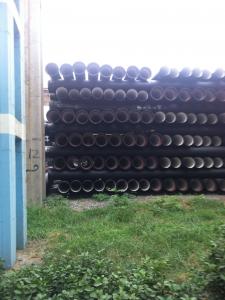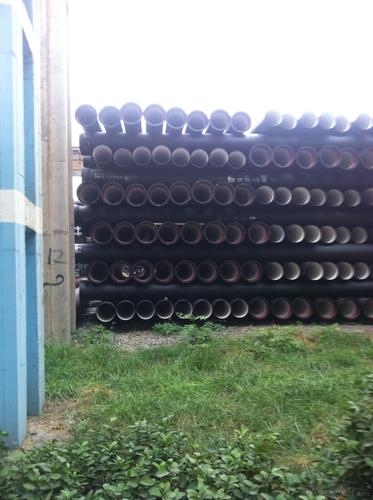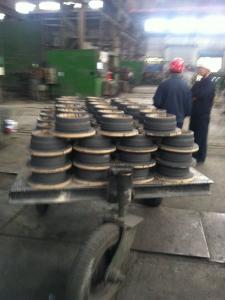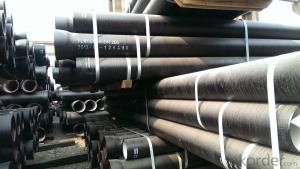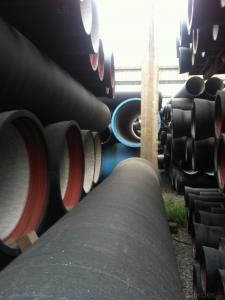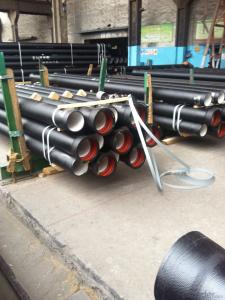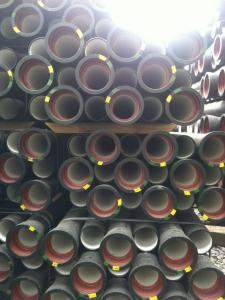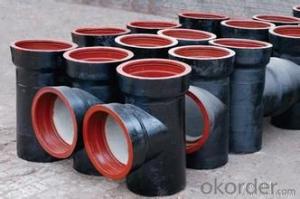DUCTILE IRON PIPE AND PIPE FITTINGS K7 CLASS DN450
- Loading Port:
- Tianjin
- Payment Terms:
- TT OR LC
- Min Order Qty:
- 23 pc
- Supply Capability:
- 3000 pc/month
OKorder Service Pledge
OKorder Financial Service
You Might Also Like
· Material : Ductile Cast Iron
· Size Range : DN 80mm to DN 2000mm
· Unit Effective Length : 6m or 5.7m
· Manufacture Standard: ISO 2531:1998/ EN 545:2006/EN 598:2007
· Annual capacity : 200,000 tons
· Coating Exterior: Zinc 130g/m2 according to ISO 8179-1 and bitumen coating 70 microns.
· Cement Interior: Portland Cement/ High Alumina Cement/ Sulphate Resisting Cement Lining according to ISO 4179
· Special requirements on external coating and internal lining can be applied
· We also provide accessories such as SBR/EPDM rubber gaskets, lubricant paste, pipe caps, PE sleeves, etc.
Additional Parts:
Each pipe is strictly inspected according to related standard to ensure permanently high performance.
Easy Installation at site and service free for life
Long Service Lifespan
Quotation will arrive you within 24hours once we get your inquiry.
We guarantee offering you a competitive price.
A copy of original inspection reports of pipes will be offered after shipment.
Photos of loading process will be sent to the customer after shipment effect.
We will follow-up the delivery progress after shipment effect and update to the customer on weekly basis.
- Q: How do ductile iron pipes perform in extreme weather conditions?
- Ductile iron pipes are renowned for their outstanding performance when faced with harsh weather conditions. Crafted from an iron alloy infused with small quantities of carbon and other elements, these pipes exhibit unparalleled strength and resilience, rendering them highly impervious to the effects of extreme weather. In soaring temperatures, ductile iron pipes maintain their structural integrity without succumbing to softening or deformation, unlike certain other materials. This ensures that the pipes continue to function optimally and reliably, even in scorching heat. Furthermore, these pipes boast a remarkable resistance to thermal expansion, thereby minimizing the risk of pipe distortion or joint failure during temperature fluctuations. When confronted with frigid conditions, ductile iron pipes also excel. They possess a low coefficient of thermal expansion, translating to a reduced likelihood of cracking or fracturing due to freezing temperatures. Moreover, their robustness and flexibility enable them to withstand the pressure exerted by freezing water inside the pipes without incurring significant damage. In addition, ductile iron pipes exhibit superb corrosion resistance, demonstrating their ability to withstand the detrimental effects of harsh chemicals, saltwater, and other corrosive substances that may be present in extreme weather conditions. This corrosion resistance ensures the longevity and dependability of the pipes, preventing leaks and preserving water quality. In terms of durability, ductile iron pipes are designed to endure heavy loads and external stresses. Boasting high tensile strength, they display resistance to bending and breakage. This characteristic proves crucial in extreme weather conditions where heavy rainfall, powerful winds, or even seismic activities may occur. All in all, ductile iron pipes have a well-established reputation for delivering exceptional performance in extreme weather conditions. Their strength, resilience, thermal stability, corrosion resistance, and durability render them a reliable choice for a multitude of applications, including water supply, sewage systems, and industrial pipelines, even in the most challenging weather environments.
- Q: Do ductile iron pipes require internal linings for potable water?
- No, ductile iron pipes do not require internal linings for potable water. Ductile iron is a type of iron that has been treated to enhance its strength and flexibility. It is commonly used for water distribution systems due to its durability and resistance to corrosion. Unlike other materials, such as cast iron or steel, ductile iron pipes have a protective layer called a cement-mortar lining, which provides an effective barrier against corrosion and prevents the leaching of any harmful substances into the water. This lining is applied during the manufacturing process and is designed to withstand the corrosive properties of potable water, making internal linings unnecessary. Additionally, the smooth surface of ductile iron pipes helps to maintain the quality and flow of water without the need for additional linings.
- Q: What are the different types of joints used with ductile iron pipe?
- The different types of joints commonly used with ductile iron pipe include push-on joints, mechanical joints, restrained joints, flanged joints, and welded joints. Each type of joint offers different benefits and is used depending on the specific requirements of the installation.
- Q: How to control mortar proportioning in ductile iron pipe cement coating
- The calculation steps are: first to calculate the amount of plastering engineering (area), and then check the "national construction basic quota" quota in the corresponding amount of mortar project, engineering quantity multiplied by the amount of mortar that fixed amount of mortar, the mortar amount multiplied by the corresponding mix ratio of mortar, the consumption of raw materials can be obtained.
- Q: Which is better, ductile iron pipe and spray plastic pipe?
- Ductile cast iron: the use of more than 18 by adding nodulizer, after centrifugal ductile cast iron machine high speed centrifugal cast pipe, called "ductile" (Ductile Cast Iron Pipes), referred to as ball pipe, ductile iron pipe and ductile iron pipe etc.. The utility model is mainly used for conveying water, and is an ideal choice for tap water pipes.
- Q: How does ductile iron pipe perform in areas with high soil corrosivity?
- Due to its inherent corrosion-resistant properties, ductile iron pipe exhibits exceptional performance in areas with high soil corrosivity. The material specifically utilized in ductile iron pipes is engineered to endure harsh soil conditions, including those with elevated levels of corrosive elements. The protective coating is one of the key factors making ductile iron pipe suitable for areas with high soil corrosivity. Most ductile iron pipes are coated with either a layer of cement mortar or a polyethylene sleeve, which acts as a barrier separating the soil from the pipe. This coating serves the dual purpose of preventing direct contact between the soil and the iron, as well as providing an additional layer of defense against corrosion. Moreover, ductile iron possesses inherent corrosion resistance. It contains a higher carbon percentage compared to traditional cast iron, enhancing its strength and durability. The carbon content also generates a protective layer of graphite within the iron matrix, acting as a natural barrier against corrosion. Ductile iron pipes have demonstrated a long service life in areas with high soil corrosivity, often surpassing 100 years. This is due to their ability to withstand corrosion and maintain structural integrity even in harsh environments. Additionally, ductile iron pipes exhibit high resistance to external loads and can endure the stresses associated with high soil corrosivity. In summary, ductile iron pipe is an exceptional choice for areas with high soil corrosivity. Its corrosion-resistant properties, coupled with protective coatings, guarantee the pipe's durability and reliability, even under the most challenging soil conditions.
- Q: How can the old water pipe ductile iron pipe be opened with three flanges?
- Cast iron pipe is not good then did not take the treatment is not good in the local search do you master plumbing to the scene to see the actual situation, some teachers have you unexpected strain interpretation way.
- Q: How do ductile iron pipes handle water hammer?
- Ductile iron pipes are known for their excellent resistance to water hammer, which refers to the sudden increase in pressure and velocity of water flow within a pipe system. This phenomenon occurs when there is a sudden change in the water's velocity, such as when a valve is closed abruptly or a pump is suddenly shut off. Ductile iron pipes are designed to withstand high-pressure surges caused by water hammer. Their enhanced strength and flexibility enable them to absorb and dissipate the energy generated during these pressure surges. The ductility of the material allows the pipe to deform slightly under the impact of the water hammer, preventing the pipe from rupturing or breaking. Moreover, ductile iron pipes have inherent damping properties, which means they can absorb and dissipate the energy of water hammer more effectively compared to other pipe materials. This helps to reduce the intensity and duration of the pressure surges, minimizing the potential damage to the pipe system and its components. Additionally, ductile iron pipes are often equipped with various fittings and accessories that further enhance their ability to handle water hammer. These include specialized joint designs, such as restrained joints or flexible couplings, which provide additional flexibility and resistance to pressure surges. Overall, ductile iron pipes are specifically engineered to handle the challenges posed by water hammer. Their strength, flexibility, damping properties, and specialized fittings make them an ideal choice for applications where water hammer is a concern, providing a reliable and durable solution for water distribution systems.
- Q: Are ductile iron pipes suitable for use in food processing plants?
- Yes, ductile iron pipes are suitable for use in food processing plants. Ductile iron is highly durable and corrosion-resistant, making it suitable for transporting various fluids in food processing facilities. Additionally, ductile iron pipes are approved for use in potable water systems, further indicating their suitability for food-related applications.
- Q: Can ductile iron pipes be used for dam construction?
- Indeed, dam construction can utilize ductile iron pipes. Renowned for their robustness, longevity, and resistance to corrosion, these pipes prove apt for various purposes, including the construction of dams. They exhibit remarkable resilience under intense pressure, rendering them perfect for transporting water and other fluids throughout the dam's framework. Moreover, their capacity to withstand external forces and ground shifts establishes them as a dependable option for dam construction. Furthermore, the relative ease of installation and maintenance of ductile iron pipes enhances their appropriateness for dam construction endeavors.
Send your message to us
DUCTILE IRON PIPE AND PIPE FITTINGS K7 CLASS DN450
- Loading Port:
- Tianjin
- Payment Terms:
- TT OR LC
- Min Order Qty:
- 23 pc
- Supply Capability:
- 3000 pc/month
OKorder Service Pledge
OKorder Financial Service
Similar products
Hot products
Hot Searches
Related keywords
